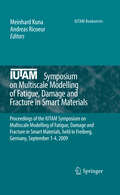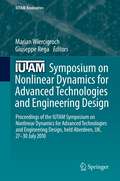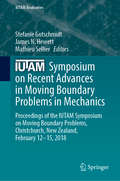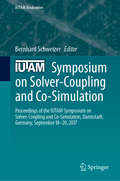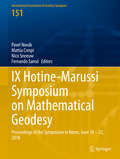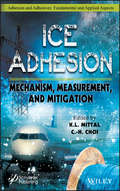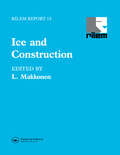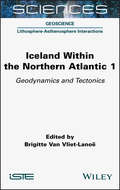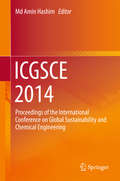- Table View
- List View
IUTAM Symposium on Model Order Reduction of Coupled Systems, Stuttgart, Germany, May 22–25, 2018: MORCOS 2018 (IUTAM Bookseries #36)
by Jörg Fehr Bernard HaasdonkThis volume contains the proceedings of the IUTAM Symposium on Model Order Reduction of Coupled System, held in Stuttgart, Germany, May 22–25, 2018. For the understanding and development of complex technical systems, such as the human body or mechatronic systems, an integrated, multiphysics and multidisciplinary view is essential. Many problems can be solved within one physical domain. For the simulation and optimization of the combined system, the different domains are connected with each other. Very often, the combination is only possible by using reduced order models such that the large-scale dynamical system is approximated with a system of much smaller dimension where the most dominant features of the large-scale system are retained as much as possible. The field of model order reduction (MOR) is interdisciplinary. Researchers from Engineering, Mathematics and Computer Science identify, explore and compare the potentials, challenges and limitations of recent and new advances.
IUTAM Symposium on Multiscale Modelling of Fatigue, Damage and Fracture in Smart Materials
by Andreas Ricoeur Meinhard KunaToday, multi-functional materials such as piezoelectric/ferroelectric ceramics, magneto-strictive and shape memory alloys are gaining increasing applications as sensors, actuators or smart composite materials systems for emerging high tech areas. The stable performance and reliability of these smart components under complex service loads is of paramount practical importance. However, most multi-functional materials suffer from various mechanical and/or electro-magnetical degra-dation mechanisms as fatigue, damage and fracture. Therefore, this exciting topic has become a challenge to intensive international research, provoking the interdisciplinary approach between solid mechanics, materials science and physics. This book summarizes the outcome of the above mentioned IUTAM-symposium, assembling contributions by leading scientists in this area. Particularly, the following topics have been addressed: (1) Development of computational methods for coupled electromechanical field analysis, especially extended, adaptive and multi-level finite elements. (2) Constitutive modeling of non-linear smart material behavior with coupled electric, magnetic, thermal and mechanical fields, primarily based on micro-mechanical models. (3) Investigations of fracture and fatigue in piezoelectric and ferroelectric ceramics by means of process zone modeling, phase field simulation and configurational mechanics. (4) Reliability and durability of sensors and actuators under in service loading by alternating mechanical, electrical and thermal fields. (5) Experimental methods to measure fracture strength and to investigate fatigue crack growth in ferroelectric materials under electromechanical loading. (6) New ferroelectric materials, compounds and composites with enhanced strain capabilities.
IUTAM Symposium on Nonlinear Dynamics for Advanced Technologies and Engineering Design
by Giuseppe Rega Marian WiercigrochNonlinear dynamics has been enjoying a vast development for nearly four decades resulting in a range of well established theory, with the potential to significantly enhance performance, effectiveness, reliability and safety of physical systems as well as offering novel technologies and designs. By critically appraising the state-of-the-art, it is now time to develop design criteria and technology for new generation products/processes operating on principles of nonlinear interaction and in the nonlinear regime, leading to more effective, sensitive, accurate, and durable methods than what is currently available. This new approach is expected to radically influence the design, control and exploitation paradigms, in a magnitude of contexts. With a strong emphasis on experimentally calibrated and validated models, contributions by top-level international experts will foster future directions for the development of engineering technologies and design using robust nonlinear dynamics modelling and analysis.
IUTAM Symposium on Physics and Mechanics of Sea Ice: Proceedings of the IUTAM Symposium held at Aalto University, Espoo, Finland, 3-9 June 2019 (IUTAM Bookseries #39)
by Jukka Tuhkuri Arttu PolojärviThis book presents the results of the IUTAM Symposium on Physics and Mechanics of Sea Ice which brought together researchers who have made significant contributions in the study of sea ice. The topics include: Fracture of ice, Thermodynamics of sea ice ridges, Global and local ice loads on ships and marine structures, Computational ice engineering and ice mechanics; and Physical and engineering problems related to ice and waves.
IUTAM Symposium on Recent Advances in Moving Boundary Problems in Mechanics: Proceedings of the IUTAM Symposium on Moving Boundary Problems, Christchurch, New Zealand, February 12-15, 2018 (IUTAM Bookseries #34)
by Stefanie Gutschmidt James N. Hewett Mathieu SellierMany problems in mechanics involve deformable domains with moving boundaries, including fluid-structure interaction, multiphase flows, flows over soft tissues and textiles, or flows involving accretion/erosion to name but a few. The presence of a moving boundary presents considerable challenges when it comes to modelling and understanding the underlying system dynamics. This proceedings volume collects contributions made at the IUTAM Symposium on Recent Advances in Moving Boundary Problems in Mechanics held in Christchurch, New Zealand in February 2018.
IUTAM Symposium on Solver-Coupling and Co-Simulation: Proceedings of the IUTAM Symposium on Solver-Coupling and Co-Simulation, Darmstadt, Germany, September 18-20, 2017 (IUTAM Bookseries #35)
by Bernhard SchweizerThis is the Proceedings of the IUTAM Symposium on Solver Coupling and Co-Simulation that was held in Darmstadt, Germany, September 18-20, 2017. The symposium focused on recent advances in the development of numerical methods for solver coupling, like new explicit, implicit and semi-implicit co-simulation methods, new approaches for realizing variable communication-time grids, and advances in the stability and convergence analysis of solver coupling methods.Recent developments in the practical application of co-simulation methods, for instance new fields of application for solver coupling approaches, new developments in the parallelization of dynamic models with co-simulation techniques, and standardization of co-simulation interfaces, i.e. standardization of data and model exchange were also discussed.The book brings together the research results of leading scientists in applied mathematics, mechanics, and engineering science, thus contributing to further develop numerical methods for coupled simulations.
IUTAM Symposium on Surface Effects in the Mechanics of Nanomaterials and Heterostructures
by Alan Cocks Jianxiang WangThis volume constitutes the proceedings of the IUTAM Symposium on Surface Effects in the Mechanics of Nanomaterials and Heterostructures, held in Beijing, 8-12 August, 2010. The symposium brought together the most active scientists working in this area from the fields of solid mechanics, composites, physics, and materials science and summarized the state-of-the-art research results with a view to advancing the frontiers of mechanics and materials physics. Nanomaterials and heterostructures have a large fraction of their atoms at surfaces and interfaces. These atoms see a different environment to those in the interior and can have a substantial effect on the overall mechanical and physical behaviour of a material. The last decade has witnessed a growing interest in the study of surfaces and how the surface behaviour couples with that of the bulk to determine the overall system response. The papers in this proceedings cover: extension of continuum mechanics and thermodynamics to the nano-scale; multiscale simulations; surface effects in monolithic nano-scale elements and nanostructures; mechanical and physical properties of nanomaterials and heterostructures; self-assembly, etc. The surface stress effect is inherently a multidisciplinary and fertile field; the Symposium truly reflects these features. This IUTAM Symposium was also dedicated to Professor Bhushan L Karihaloo of Cardiff University on his impending retirement, in recognition of his contributions to the fields of solid mechanics and nanomechanics, and to IUTAM activities in general.
IUTAM Symposium on The Physics of Wall-Bounded Turbulent Flows on Rough Walls
by T. B. NickelsThis work describes the state-of-the-art in the understanding of turbulent wall-bounded flows developing on rough surfaces. This symposium brought together the best researchers in the field to discuss the technical issues and develop a consistent approach to the subject - hence it is an up-to-date reference work for research in this area.
IX Hotine-Marussi Symposium on Mathematical Geodesy: Proceedings of the Symposium in Rome, June 18 – 22, 2018 (International Association of Geodesy Symposia #151)
by Fernando Sansò Nico Sneeuw Mattia Crespi Pavel NovákThis volume gathers the proceedings of the IX Hotine-Marussi Symposium on Mathematical Geodesy, which was held from 18 to 22 June 2018 at the Faculty of Civil and Industrial Engineering, Sapienza University of Rome, Italy. Since 2006, the Hotine-Marussi Symposia series has been produced under the auspices of the Inter-Commission Committee on Theory (ICCT) within the International Association of Geodesy (IAG). The ICCT has organized the last four Hotine-Marussi Symposia, held in Wuhan (2006) and Rome (2009, 2013 and 2018). The overall goal of the ICCT and Hotine-Marussi Symposia has always been to advance geodetic theory, as reflected in the 25 peer-reviewed research articles presented here.The IX Hotine-Marussi Symposium was divided into 10 topical sessions covering all aspects of geodetic theory including reference frames, gravity field modelling, adjustment theory, atmosphere, time series analysis and advanced numerical methods. In total 118 participants attended the Symposium and delivered 82 oral and 37 poster presentations. During a special session at the Accademia Nazionale deiLincei, the oldest scientific academy in the world, six invited speakers discussed interactions of geodesy with oceanography, glaciology, atmospheric research, mathematics, Earth science and seismology.
IX Latin American Congress on Biomedical Engineering and XXVIII Brazilian Congress on Biomedical Engineering: Proceedings of CLAIB and CBEB 2022, October 24–28, 2022, Florianópolis, Brazil—Volume 1: Bioengineering and Biomaterials (IFMBE Proceedings #98)
by Jefferson Luiz Brum Marques Cesar Ramos Rodrigues Daniela Ota Hisayasu Suzuki José Marino Neto Renato García OjedaThis book reports on the latest research and developments in Biomedical Engineering, with a special emphasis on topics of interest and findings achieved in Latin America. This first volume of a 4-volume set covers advances in modeling and simulation of biological and biomedical systems, mechanical characterization, and biological evaluation of biomaterials for medical applications, including tissues regeneration. It also covers some related special topics, such as advanced methodologies for agricultural and food production and public health management. Throughout the book, a special emphasis is given to low-cost technologies and to their development for and applications in clinical settings. Based on the IX Latin American Conference on Biomedical Engineering (CLAIB 2022) and the XXVIII Brazilian Congress on Biomedical Engineering (CBEB 2022), held jointly, and virtually on October 24-28, 2022, from Florianópolis, Brazil, this book provides researchers and professionals in the biomedical engineering field with extensive information on new technologies and current challenges for their clinical applications..
IX Latin American Congress on Biomedical Engineering and XXVIII Brazilian Congress on Biomedical Engineering: Proceedings of CLAIB and CBEB 2022, October 24–28, 2022, Florianópolis, Brazil—Volume 2: Biomedical Signal Processing and Micro- and Nanotechnologies (IFMBE Proceedings #99)
by Jefferson Luiz Brum Marques Cesar Ramos Rodrigues Daniela Ota Hisayasu Suzuki José Marino Neto Renato García OjedaThis book reports on the latest research and developments in Biomedical Engineering, with a special emphasis on topics of interest and findings achieved in Latin America. This first volume of a 4-volume set covers advances in biomedical image and signal processing, biomedical optics, and wearable and assistive medical devices. Throughout the book, a special emphasis is given to low-cost technologies and to their development for and applications in clinical settings. Based on the IX Latin American Conference on Biomedical Engineering (CLAIB 2022) and the XXVIII Brazilian Congress on Biomedical Engineering (CBEB 2022), held jointly, and virtually on October 24-28, 2022, from Florianópolis, Brazil, this book provides researchers and professionals in the biomedical engineering field with extensive information on new technologies and current challenges for their clinical applications..
IX Latin American Congress on Biomedical Engineering and XXVIII Brazilian Congress on Biomedical Engineering: Proceedings of CLAIB and CBEB 2022, October 24–28, 2022, Florianópolis, Brazil—Volume 3: Biomechanics, Biomedical Devices and Assistive Technologies (IFMBE Proceedings #100)
by Jefferson Luiz Brum Marques Cesar Ramos Rodrigues Daniela Ota Hisayasu Suzuki José Marino Neto Renato García OjedaThis book reports on the latest research and developments in Biomedical Engineering, with a special emphasis on topics of interest and findings achieved in Latin America. This third volume of a 4-volume set covers advances in biomechanical analysis and modeling, neural network based methods for medical diagnosis and therapy, and robots and human-machine interface for rehabilitation. Throughout the book, a special emphasis is given to low-cost technologies and to their development for and applications in clinical settings. Based on the IX Latin American Conference on Biomedical Engineering (CLAIB 2022) and the XXVIII Brazilian Congress on Biomedical Engineering (CBEB 2022), held jointly, and virtually on October 24-28, 2022, from Florianópolis, Brazil, this book provides researchers and professionals in the biomedical engineering field with extensive information on new technologies and current challenges for their clinical applications..
IX Latin American Congress on Biomedical Engineering and XXVIII Brazilian Congress on Biomedical Engineering: Proceedings of CLAIB and CBEB 2022, October 24–28, 2022, Florianópolis, Brazil—Volume 4: Clinical Engineering and Health Technologies (IFMBE Proceedings #101)
by Jefferson Luiz Brum Marques Cesar Ramos Rodrigues Daniela Ota Hisayasu Suzuki José Marino Neto Renato García OjedaThis book reports on the latest research and developments in Biomedical Engineering, with a special emphasis on topics of interest and findings achieved in Latin America. This fourth volume of a 4-volume set focuses on health technology assessment, quality of healthcare technologies, and innovation in health technologies. It discusses advances in medical device monitoring, issues in patient safety, methods for medical error analysis and medical data management, and other related topics. Throughout the book, a special emphasis is given to low-cost technologies and to their development for and applications in clinical settings. Based on the IX Latin American Conference on Biomedical Engineering (CLAIB 2022) and the XXVIII Brazilian Congress on Biomedical Engineering (CBEB 2022), held jointly, and virtually on October 24-28, 2022, from Florianópolis, Brazil, this book provides researchers and professionals in the biomedical engineering field with extensive information on new technologies and current challenges for their clinical applications..
Ice Adhesion: Mechanism, Measurement, and Mitigation (Adhesion and Adhesives: Fundamental and Applied Aspects)
by K. L. Mittal C. H. ChoiThe book containing 18 chapters is divided into three parts: Part 1: Fundamentals of Ice Formation and Ice Characteristics; Part 2: Ice Adhesion and Its Measurement; and Part 3: Methods to Mitigate Ice Adhesion. The topics covered Include: Factors influencing the formation, adhesion and friction of ice; ice nucleation on solid surfaces; physics of ice nucleation and growth on a surface; condensation frosting; defrosting properties of structured surfaces; relationship between surface free energy and ice adhesion to surfaces; metrology of ice adhesion; test methods for quantifying ice adhesion strength to surfaces; interlaboratory studies of ice adhesion strength; mechanisms of surface icing and deicing technologies; anti-icing using microstructured surfaces; durability assessment of icephobic coatings; bio-inspired icephobic coatings; challenges in rational fabrication of icephobic surfaces; protection from ice accretion on aircraft; and numerical modeling and its application to inflight icing.
Ice Age Floodscapes of the Pacific Northwest: A Photographic Exploration
by Bruce Norman BjornstadThis heavily illustrated book contains descriptions and geologic interpretations of photographs (mostly aerial) illustrating the power and magnitude of repeated Ice Age flooding in the Pacific Northwest, as recently as 14,000 years ago. The scale of Ice Age floods was so huge that today it is often difficult to see and appreciate the power and magnitude of such megafloods from ground level. However, from the air, landforms created by the floods often come into clear focus. Aerial images, obtained via unmanned aerial vehicle (drone) as well as fixed-wing airplane, add a new perspective on evidence gathered by dozens of scientists since 1923.
Ice Cream
by Richard W Hartel H Douglas GoffIce Cream, 7th Edition focuses on the science and technology of frozen dessert production and quality. It explores the entire scope of the ice cream and frozen dessert industry, from the chemical, physical, engineering and biological principles of the production process to the distribution of the finished product. It is intended for industry personnel from large to small scale processors and suppliers to the industry and for teachers and students in dairy or food science or related disciplines. While it is technical in scope, it also covers much practical knowledge useful to anyone with an interest in frozen dessert production. World-wide production and consumption data, global regulations and, as appropriate, both SI and US units are provided, so as to ensure its relevance to the global frozen dessert industry. This edition has been completely revised from the previous edition, updating technical information on ingredients and equipment and providing the latest research results. Two new chapters on ice cream structure and shelf-life have been added, and much material has been rearranged to improve its presentation. Outstanding in its breadth, depth and coherence, Ice Cream, 7th Edition continues its long tradition as the definitive and authoritative resource for ice cream and frozen dessert producers.
Ice Cream
by Richard W. Hartel H. Douglas Goff Scott A. RankinIt is more than 10 years since the 7th Edition published in 2013, and plenty has changed in the field of ice cream and frozen desserts. The phenomenal growth of “better for you” and “non-dairy” frozen dessert categories, and the much greater attention to microbiological quality, are just some examples. In this revision, we updated all content to present the latest in ingredients, formulations, processing equipment and food safety, as well as add several new chapters to provide a more complete coverage of the wider aspects of frozen dessert formulation and production.
Ice Cream Man: How Augustus Jackson Made a Sweet Treat Better
by Glenda Armand Kim FreemanDiscover the inspiring story of Augustus Jackson, an African American entrepreneur who is known as "the father of ice cream," in this beautifully illustrated picture-book biography.Augustus Jackson was born in 1808 in Philadelphia. While most African Americans were enslaved at that time, in Pennsylvania, slavery was against the law. But while Augustus and his family were free, they were poor, and they depended on their garden and their chickens for food. Augustus enjoyed helping his mom prepare meals for their family. He dreamed of becoming a professional cook, and when his mom suggested he may be able to make meals for the president one day, Augustus didn&’t waste any time in making that dream a reality. In 1820, when he was only twelve years old, he set off for Washington, DC. He applied to work in the White House, where the head cook offered him a job as a kitchen helper. After five years of working hard, Augustus, or Gus, was promoted to cook. He went on to serve presidents James Monroe, John Quincy Adams, and Andrew Jackson.During his time at the White House, Augustus became an expert at making a popular egg-based dessert. He soon made an eggless version—known to us today as ice cream—and left the White House determined to make and sell the frozen treat to everyone, not just the wealthy. Gus headed back home to Philadelphia, and in 1830, he opened his very own ice cream parlor. He devised a way to keep the ice cream frozen so that it could be shipped and sold to other businesses. Gus also began adding rock salt to the ice that he used to make his ice cream, which made the mixture freeze more quickly. This allowed him to speed up his production process. He created more ice cream with new flavors, and soon he was shipping product via train to places like New York City, which was 100 miles away. Gus&’s dream had come true, and better yet, he had brought smiles to many faces.Shining a light on a little-known visionary, this inspiring picture-book biography includes an afterword, a list of sources, and an easy-to-follow recipe so readers can make their own delicious ice cream!
Ice Microfluidics: Ice as Size-Tunable Separation Field and Physicochemical Nature of Freeze Concentrated Solutions (Springer Theses)
by Arinori InagawaThis book explores the possibility of using micro/nanostructures formed on the doped ice surface as a novel separation platform. In addition, it provides comprehensive information on the nature of freeze-concentrated solutions (FCSs) and the ice/FCS interface, which play important roles in the natural environment and industrial processes alike. The book proposes a novel size-selective separation approach using channels formed on the doped ice surface. The separation is based on the physical interaction of analytes with channel walls, which is controlled by varying the channel width through temperature and dopant concentration changes. It also shows the precise control of the channel width to be in a range of 200 nm–4 μm and demonstrates the size-selective separation of microspheres, cells, and DNA. The physicochemical properties of FCSs are measured to reveal the nature of the ice/FCS interface, and the zeta potentials of ice are measured by determining EOF rates in a microchannel fabricated in the ice. The deprotonation at OH dangling bonds and adsorption of ions are also discussed. The viscosities of FCSs confined in micro/nanospaces are evaluated by means of two spectroscopic methods. When an FCS is confined in small spaces surrounded by ice, the viscosity increases compared to that in a bulk solution. Interestingly, this viscosity enhancement occurs even though its size is on the micrometer scale. These parameters are essential to discussing the unique phenomena occurring in FCSs. This book provides an explanation of the scientific processes taking place in FCSs, and reveals the potential that frozen solutions hold as innovative micro/nanofluidic devices and reaction platforms.
Ice Rivers: A Story of Glaciers, Wilderness, and Humanity
by Jemma WadhamA passionate eyewitness account of the mysteries and looming demise of glaciers—and what their fate means for our shared futureThe ice sheets and glaciers that cover one-tenth of Earth's land surface are in grave peril. High in the Alps, Andes, and Himalaya, once-indomitable glaciers are retreating, even dying. Meanwhile, in Antarctica, thinning glaciers may be unlocking vast quantities of methane stored for millions of years beneath the ice. In Ice Rivers, renowned glaciologist Jemma Wadham offers a searing personal account of glaciers and the rapidly unfolding crisis that they—and we—face.Taking readers on a personal journey from Europe and Asia to Antarctica and South America, Wadham introduces majestic glaciers around the globe as individuals—even friends—each with their own unique character and place in their community. She challenges their first appearance as silent, passive, and lifeless, and reveals that glaciers are, in fact, as alive as a forest or soil, teeming with microbial life and deeply connected to almost everything we know. They influence crucial systems on which people depend, from lucrative fisheries to fertile croplands, and represent some of the most sensitive and dynamic parts of our world. Their fate is inescapably entwined with our own, and unless we act to abate the greenhouse warming of our planet the potential consequences are almost unfathomable.A riveting blend of cutting-edge research and tales of encounters with polar bears and survival under the midnight sun, Ice Rivers is an unforgettable portrait of—and love letter to—our vanishing icy wildernesses.
Ice Structures for Airfield Construction (Springer Aerospace Technology)
by Dmitry Alexandrovich Zatuchny Anatoly Ivanovich Kozlov Yuri Grigoryevich Shatrakov Alexander Ivanovich Logvin Oksana Gennadyevna FeoktistovaThis book analyzes various properties and structures of ice from the point of view to solve problems in civil aviation. The Arctic zone of the Russian Federation, together with large territories of Siberia and the Far East, is a zone, that is insufficiently provided with ground navigation facilities, as well as platforms and airfields for landing aircraft, including in the event of unpredictable situations. However, most of this area, especially in winter, is covered with ice, which can be used to solve this problem. The possibility of using ice sheets for the construction of airfields or the location of ground-based flight support facilities requires careful study and analysis. This book is devoted to the study of the properties and structure of ice, with a view for use in civil aviation to construct ice airfields and the placement of ground-based flight support facilities.
Ice and Construction
by L. MakkonenThis book focuses on two areas of ice technology: the use of ice as a construction material and the problems caused by ice to constructions. In connection with describing past and potential future applications of using ice in construction, a detailed discussion on the mechanical properties of ice is given. A state of the art description on ice-maki
Iceland Within the Northern Atlantic, Volume 1: Geodynamics and Tectonics
by Brigitte Van Vliet-LanoëThe volcanic island of Iceland is a unique geological place due both to its position in the middle of the Atlantic Ocean and its repeated glaciations. It has been an accurate recorder of geodynamic and regional climatic evolutions for at least the last 15 million years.This book traces the history of Iceland, which is linked to the opening of the North Atlantic and the reactivation of the ancient suture of the Iapetus Ocean. It gives a view of climate evolution that is partly controlled by the dynamics of the ocean floor and analyzes the movement of the Jan Mayen tectonic plate and the progressive insularization of the Greenland–Faroe Ridge, which gave birth to Iceland. It also tries to understand the formation and migration of the deep Iceland hotspot and the lava flows that have, for millions of years, shaped this island.This book brings together the internal and external geodynamics of our planet to understand how Iceland functions and its role as a recorder of the paleoclimatic evolution of the Northern Hemisphere.
Icephobic Materials for Anti/De-icing Technologies
by Yizhou ShenThis book fills the gap in the field of anti-icing by providing a comprehensive introduction to anti-icing materials and their technology. Additionally, the contents are important guidance for researchers, engineers, and graduate and undergraduate students. Icing can cause malfunctions or serious performance degradation in outdoor facilities, such as transportation and energy equipment, resulting in significant economic losses and even loss of life. With the rapid development of the aviation and renewable energy industries, minimizing anti-icing has become an urgent scientific problem worldwide. Traditional thermal and mechanical de-icing methods are used to prevent or inhibit ice formation, but they consume a huge amount of energy. Therefore, it is necessary to develop new passive anti-icing technologies. In the last decade, icephobic materials have received increasing attention as commonly used passive anti-icing materials.
Icgsce 2014
by Md Amin HashimThis book includes selected papers from the ICGSCE 2014 with focus on the current trends of global resources used to meet the growing demands to improve life style coupled with environmental and social problems related to the resource consumption with emphasize to move towards sustainable development. It provides a platform for scientists and academicians from local and international universities and industries to promote, share and discuss various new issues and developments in different areas of Chemical Engineering with respect to global sustainability. Under the sustainability umbrella the topics covered are; alternative energy sources, alternative feedstock for energy and chemicals, alternative raw materials for household commodity, green process with minimal environmental impact, process intensification, waste minimization, recycling of wastes and providing quality water, food and medicines. Other topics covered include: 1. Oil and gas, Biofuel, Fuel cell, Renewable energy 2. Green technology, Sustainability, Environmental, Carbon sequestration, Carbon footprint, Natural resources 3. Chemical processes, Separation technology, Biotechnology, Nanotechnology, Food technology, Particle technology, Corrosion, Pharmaceutical, Phytochemical, Oleochemical 4. Process modeling, Process Simulation, Process control 5. Advanced material, Polymer, Catalyst, Enzyme 6. Policy, Regulations, Strategy and implementation, Safety, Management of science, Engineering education 7. Process Safety and Loss Prevention, Environmental and chemical risk assessment, Transportation risk analysis, Inherent safety.

